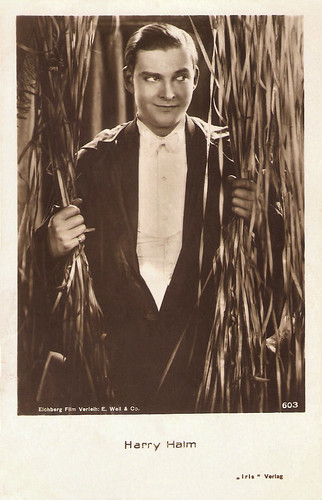
Austrian postcard by Iris Verlag, no. 603. Photo: Eichberg Film / Verleih: E. Weil & Co.
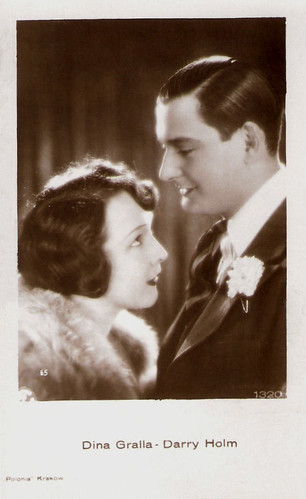
Polish postcard by Polonia, Krakow, no. 1320. Publicity still for Prinzessin Trulala/Princess Trulala (Erich Schönfelder, Richard Eichberg, 1926) with Dina Gralla.
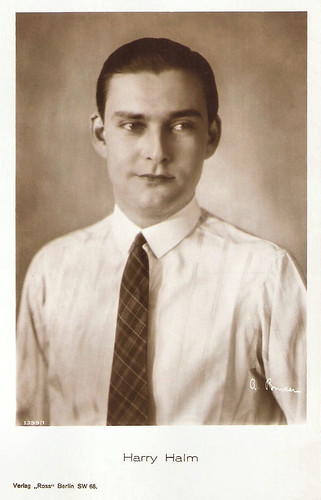
German postcard by Ross Verlag, no. 1399/1, 1927-1928. Photo: Alex Binder.
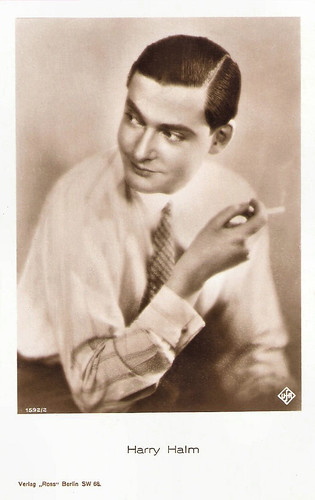
German postcard by Ross Verlag, no. 1592/2, 1927-1928. Photo: Ufa.

German postcard by Ross Verlag, no. 4554/1, 1929-1930. Photo: E.O. Hoppé, London.
Dapper charmer
Harry Halm was born in Berlin in 1901 (some sources say 1902). He was the son of the theatre manager and film director Alfred Halm.
He took acting lessons with Eduard von Winterstein and Hermann Vallentin and he began his stage career at the Schauspielhaus in Potsdam in 1919. After this engagement he went to Hamburg and later to Berlin. Halm made his first film appearance in his father’s Der galante König/The Galant King (Alfred Halm, 1920). Two years later his father directed him again in Freund Ripp/Friend Ripp (Alfred Halm, 1923) starring Käthe Haack.
From 1923 on, he appeared more regularly before the camera in such films as Der Evangelimann/The Evangelist (Holger-Madsen, 1923) with Paul Hartmann, Windstärke 9. Die Geschichte einer reichen Erbin/Wind-force 9 – The Story of a Heir (Reinhold Schünzel, 1924) with Alwin Neuss, and Kammermusik/Chamber music (Carl Froelich, 1925) starring Henny Porten.
His most popular films included Der Demütige und die Tänzerin/The Humble Man and the Dancer (Ewald André Dupont, 1925) with Lil Dagover, Moral/Morality (Willi Wolff, 1927) with Ellen Richter, and Die blaue Maus/The Blue Mouse (Johannes Guter, 1928) with Jenny Jugo. He was given leading roles in these films as a dapper charmer and ladies' man.
The young Lilian Harvey was in Die tolle Lola/Fabulous Lola (Richard Eichberg, 1927), Ihr dunkler Punkt/Her Skeleton in the Closet (Johannes Guter, 1929), and many other Ufa productions his partner. He also appeared in Jennys Bummel durch die Männer/Jenny's Stroll by the Men (Jaap Speyer, 1929) opposite Dutch film star Truus van Aalten. This Terra-film comedy was directed by Dutchman Jaap Speyer and partially filmed in the Netherlands at the beach of Scheveningen. Most of Halm’s silent films were popular, although they were not particularly striking.
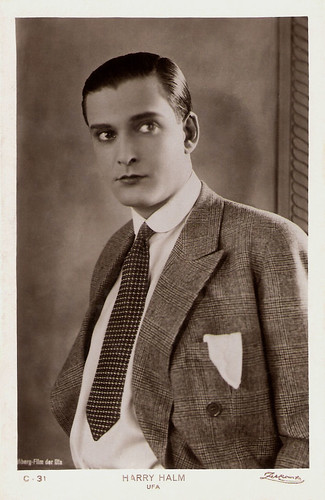
Spanish postcard by Zerkowska / IFG, no. C - 31. Photo: Ufa.

Austrian postcard by Iris Verlag, no. 5243. Photo: Eiko-Film.

German postcard by Ross Verlag, no. 1592/1, 1927-1928. Photo: Ufa. Collection: Didier Hanson.

German postcard by Ross Verlag, no. 1811/1, 1927-1928. Photo: Ufa.
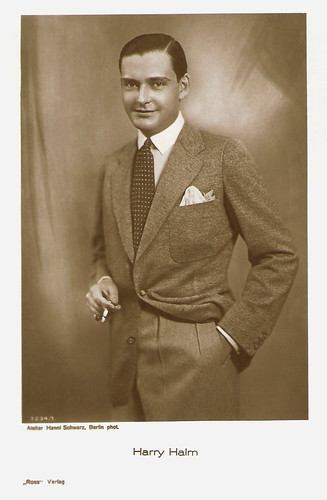
German postcard by Ross Verlag, no. 3234/1, 1928-1929. Photo: Hanni Schwarz.
Disappeared
In the sound film era, Harry Halm was only offered supporting roles. At the beginning of the 1930s, he appeared in supporting parts in the talkies Hokuspokus/Hocuspocus (Gustav Ucicky, 1930) with Willy Fritsch and Lilian Harvey, Der wahre Jakob/True Jacob (Hans Steinhoff, 1931), and Ein toller Einfall/A Mad Idea (Kurt Gerron, 1932). After the takeover of the Nazis in 1933, he was not even considered at all by Ufa and the other studios. He disappeared completely from the screen. The reason for this is unclear.
Only after the Second World War, he returned to the cinema. He suddenly turned up in the Austrian film comedies Die Welt dreht sich verkehrt/The World Turns Backward (J.A. Hübler-Kahla, 1947) with Hans Moser, and Hin und her/Back and Forth (Theo Lingen, 1948).
Halm wrote the screenplay for the film Operetta Im weissen Rössl/The White Horse Inn (Willi Forst, 1952) starring Johanna Matz and Johannes Heesters. He made some sporadic appearances in such films as Die Försterchristl/The Forester's Daughter (Arthur Maria Rabenalt, 1952) and Alraune/Mandrake (Arthur Maria Rabenalt, 1952) starring Hildegard Knef and Erich von Stroheim.
In 1955 he directed the short documentary Erfolg am laufenden Band/Success Continuously (1956). His last contribution to the cinema was a small part in Der kühne Schwimmer/The Bold Swimmer (Karl Anton, 1957) starring Gunther Philipp and Susanne Cramer.
During the 1960s he appeared a few times on German television, including a guest role in the Krimi series Das Kriminalmuseum/The Criminal Museum (1963-1970). Harry Halm died in 1980 in Munich. He was 79.
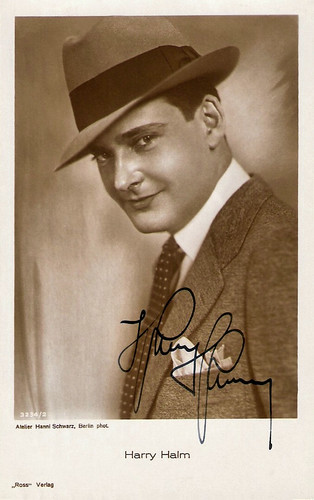
German postcard by Ross Verlag, no. 3234/2, 1928-1929. Photo: Hanni Schwarz, Berlin.
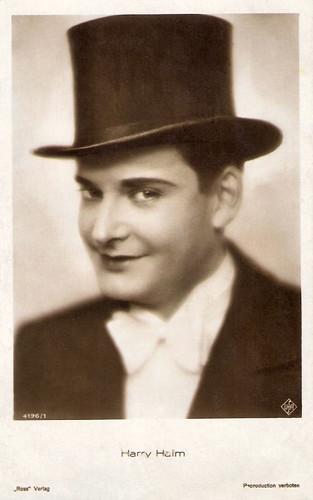
German postcard by Ross Verlag, no. 4196/1, 1929-1930. Photo: Ufa.
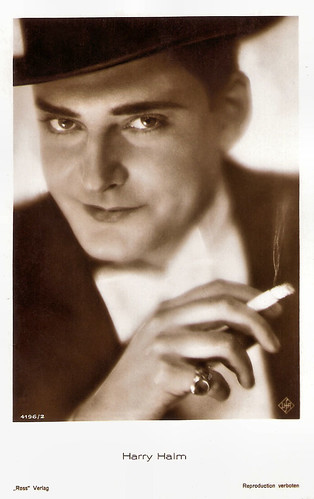
German postcard by Ross Verlag, no. 4196/2, 1929-1930. Photo: Ufa.
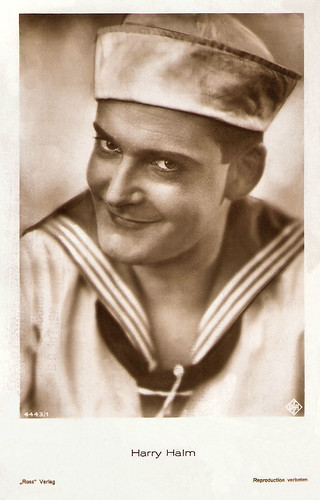
German postcard by Ross Verlag, no. 4443/1, 1929-1930. Photo: Ufa. Harry Halm in the German early sound film Wenn du einmal dein Herz verschenkst/When You One Day Give Your Heart Away (Johannes Guter, 1929) starring Halm, Igo Sym and Lilian Harvey.
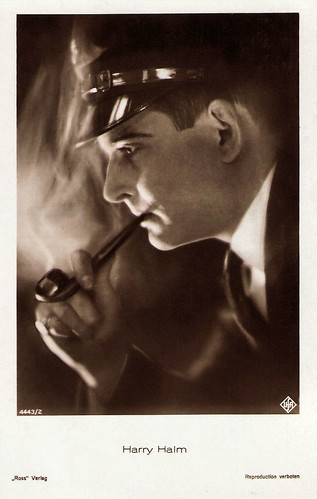
German postcard by Ross Verlag, no. 4443/2, 1929-1930. Photo: Ufa.
Sources: Thomas Staedeli (Cyranos), Filmportal, Wikipedia (German) and IMDb.
This post was last updated on 30 July 2024.
No comments:
Post a Comment